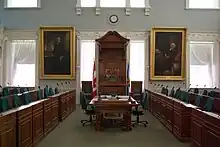Nova Scotia House of Assembly Assemblée législative de la Nouvelle-Écosse | |
|---|---|
| 64th General Assembly of Nova Scotia | |
 | |
| Type | |
| Type | Lower house (1758–1928) then unicameral house of the General Assembly of Nova Scotia |
| History | |
| Founded | 1758 |
| Leadership | |
Leader of Opposition | |
House Leader | |
Opposition House Leader | |
| Structure | |
| Seats | 55 |
 | |
Political groups | Government
Official Opposition Other Parties |
| Elections | |
Last election | August 17, 2021 |
Next election | TBD |
| Meeting place | |
 | |
| Legislative Chamber, Province House, Halifax, Nova Scotia, Canada | |
| Website | |
| nslegislature.ca/ | |
The Nova Scotia House of Assembly (French: Assemblée législative de la Nouvelle-Écosse; Scottish Gaelic: Taigh Seanaidh Alba Nuadh), or Legislative Assembly, is the deliberative assembly of the General Assembly of Nova Scotia of the province of Nova Scotia, Canada. The assembly is the oldest in Canada, having first sat in 1758;[1] in 1848, it was the site of the first responsible government in the British Empire. Bills passed by the House of Assembly are given royal assent by the lieutenant governor of Nova Scotia[2] in the name of the King.
Originally (in 1758), the Legislature consisted of the Crown represented by a governor (later a lieutenant governor), the appointed Nova Scotia Council holding both executive and legislative duties and an elected House of Assembly (lower chamber). In 1838, the council was replaced by an executive council with the executive function and a legislative council with the legislative functions based on the House of Lords. In 1928, the Legislative Council was abolished and the members pensioned off.
There are 55 Members of the Legislative Assembly (MLAs) representing 55 electoral districts. (Expanded from 51 electoral districts.[3]) Members nearly always represent one of the three main political parties of the province: the Nova Scotia Liberal Party, Progressive Conservative Party of Nova Scotia, and Nova Scotia New Democratic Party.
The assembly meets in Province House. Located in Halifax, Province House is a National Historic Site and Canada's oldest and smallest legislative building. It opened on February 11, 1819. The building was also originally home to the Supreme Court of Nova Scotia, and the location of the "Freedom of the Press" trial of Joseph Howe. Its main entrance is found on Hollis Street in Halifax.
Officers
A number of officers of the house are appointed in accordance with legislation passed by the house. These officers fulfil numerous functions as prescribed in the relevant legislation. There are two categories of officers:
Officers under the Authority of the Speaker
The Speaker of the House has authority over the following offices and officers:
- Clerk
- Hansard
- House Operations
- Legislative Committees
- Legislative Counsel
- Legislative Library
- Legislative Television Broadcasting Services
- Sergeant-at-Arms
- Speaker's Administration Office
Independent Officers
These include the Auditor General, the Office of the Ombudsman and the Office of the Conflict of Interest Commissioner.[4]
The Chief Electoral Officer of Nova Officer as head of Elections Nova Scotia is also appointed by a majority vote of the house and is considered an officer of the house.
Party standings
| Affiliation | Members | |
| Progressive Conservative | 32 | |
| Liberal | 16 | |
| New Democratic | 6 | |
| Independent | 1 | |
| Vacant | 0 | |
| Total |
55 | |
| Government majority |
+8 | |
Current members
Committees
Standing Committees
- Assembly Matters
- Community Services
- Natural Resources and Economic Development
- Health
- Human Resources
- Internal Affairs
- Law Amendments
- Private & Local Bills
- Public Accounts
- Veterans Affairs
Committees of the Whole House
- Bills
- Supply
- Supply Subcommittee
Select Committee
Recent Former Select Committees
(final reports filed)
- Electoral Boundaries
- Fire Safety
- National Unity
- Petroleum Product Pricing
- Workers' Compensation Act
Special Committee
- to Review the Estimates of the Auditor General and the Chief Electoral Officer
Seating Plan
Current as of October 2023[5]
See also
References
- ↑ How Canadians Govern Themselves
- ↑ Constitution Act, 1867, ss. 69 & 88; Nova Scotia House of Assembly
- ↑ Chapter 32 of Nova Scotia Acts of 2019
- ↑ "Supporting Offices". Nova Scotia Legislature. Nova Scotia House of Assembly. 4 January 2016. Retrieved 14 December 2020.
- ↑ "Seating Plan". Nova Scotia Legislature. Nova Scotia House of Assembly. 12 October 2023. Retrieved 13 October 2023.
